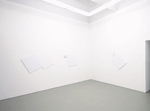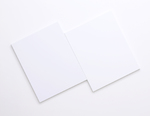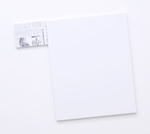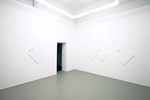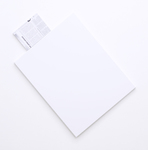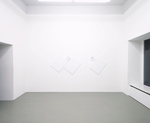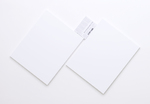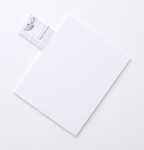Julian Ficklers Arbeiten agieren mit absurder Unschuldigkeit und changieren stark zwischen Ernsthaftigkeit und dem Spaß an der Ernsthaftigkeit.
Die weißen Leinwände und Ausschnitte aus Zeitungsartikeln hängen mit beinahe kindlicher Unbeholfenheit an den Wänden des Ausstellungsdisplays, dem White Cube. Auf diese Weise hinterfragen sie bereits ihre eigene Ausstellungs- und Herstellungsweise. Inwiefern ist die Farbe der Arbeit und die der Ausstellungswände immanent für die Präsentation? Findet tatsächlich ein Wechselspiel zwischen Arbeit und Raum statt und ist es überhaupt wichtig für die Arbeiten?
Doch die Art der Hängung ist entscheidend, denn was im ersten Eindruck unstet wirken mag, ist entschlossene Absicht: Fickler bewegt sich bewusst auf diesem schmalen Grat zwischen Ernsthaftigkeit und No-Go.
Wer traut sich heute noch eine weiße Leinwand auszustellen?
Eine Leinwand, deren Inhalt nichts als weiß zeigt, referiert auf eine weite bedeutungsschwangere Spannbreite, die von den ersten Konzeptkünstlern, bis zur ikonographischen Symbolträchtigkeit der Farbe weiß und zur Gegenstandslosigkeit im islamischen Kunstraum reicht und wird somit zu einer Projektionsfläche. Auf diese Weise sind sie ohne ein kunsthistorisches Hintergrundwissen undenkbar. Aber die Arbeiten wollen direkt sein. Sie spielen offenkundig und willentlich mit einem Avantgarde-Klischee und möchten pseudokonzeptionell wirken.
Was zeigen die Arbeiten?
In Kombination zu den leeren Leinwänden stehen kleinformatige kopierte Ausschnitte aus der Memminger Zeitung, welche die Mutter des Künstlers demselben regelmäßig zuschickt. Auch hier liegt in der einfachen Duplizierung des bereits prunklosen Materials durch die Kopie eine Reduzierung auf der Herangehensweise. Auf diese Weise pflichtet Fickler der Arbeit Ernsthaftigkeit bei. Die Segmente entstammen aus einer Kategorie innerhalb der Zeitung, die sich „Geld und Leben“ nennt und unter der sich Ratschläge für ein besseres Leben finden lassen. Diese Tipps liefern keinerlei neuartige Information, sondern sind unterm Strich gut gemeinte Ratgeber von großer Belanglosigkeit. Gerade dieses Wechselspiel zwischen dem guten Willen und der Ernsthaftigkeit der Präsentation liegen im Fokus Ficklers. In der Alltäglichkeit dieses Tageblatts werden wie selbstverständlich zwei Sachen zusammengeführt, die eigentlich nicht zusammenpassen. So wollen auch die Zeitungsausschnitte Leere mit Inhalt füllen und stehen damit im Kontrast zu den weißen Leinwänden, die nur scheinbar leer sind und doch den größtmöglichen Freiraum darstellen. Zudem fungieren die inhaltslosen Texte als kompositorisches Mittel sowohl innerhalb der Artikel als auch in Verbindung mit den Leinwänden und werden so zum Selbstzweck.
Julian Fickler’s works act with absurd innocence and oscillate between seriousness and enjoying seriousness.
With nearly puerile unwieldiness the white canvases and extracts of newspaper articles hang on the walls of the exhibition display, the white cube. In this manner they already question the form of their own presentation and production. How is the color of the works and the walls immanent for the presentation? Is an interplay between art and room actually occurring and is it important for the works after all?
Yet the way the works are hanging is decisive. What seems to be unsteady in the first place, is determined intention: Fickler walks a thin line between seriousness and no-go on purpose.
Who dares to exhibit a white canvas nowadays?
A canvas that shows nothing but white color refers to a wide pregnant range of meaning that reaches from the first concept artists over the contentful iconographic symbolism of the color white to non-figurative art in the islamic art world and so becomes a surface for projections. Thus they are unimaginable without any background knowledge about at history. But the works want to be direct. They obviously and intentionally play with an avant-garde-cliché and want to have a pseudo-conceptional appeal.
What do the works show?
The empty canvases are combined with small copied extracts from the Memminger Zeitung which the artist’s mother is sending him regularly. Again the simple duplication of the already modest material through a copy creates a reduction of the approach. Thus the artists pledges seriousness to the work. The segments come from a category in that newspaper which is called „Geld und Leben“ (eng. “Money and Life“) and where one could find advices for a better life. These tips do not provide any novel information, they are, on balance, well-intentioned advises of big triviality. This interplay between goodwill and the seriousness of presentation is the focus of Fickler’s work. The newspaper in his ordinary naturally brings together two things that actually don’t fit together. In this way they extracts want to bring content into void. And thus they contrast with the white canvases that apparently seem to be empty, but actually provide the biggest freedom for projection. Furthermore the contentless texts function as compositional elements in the articles and also in combination with the canvases and so become self purpose.
Otto Bonnen
As sugar and starch slowly built up in the green foliage some other place, the morning paper arrives wet and I am not dead.
The editor of the Memminger Zeitung may or may not know, but Wittgenstein opens his defining logical work Tractatus Logicus Philosophicus with the humble declaration that “The world is all that is the case.” This morning that is the Memminger.
In spring I grow vegetables, in the morning I read the Memminger. In the Wikipedia article on newspapers, it says that “humans exhibit a nearly universal desire to learn and share news, which they satisfy by talking to each other and sharing information.” I don’t know if that’s true, but I know that it calms my thoughts to hear about these characteristics of my species, learning about my animal flesh.
Other things I know:
I have arrived in many cities
I have seen the sun
The French philosopher Michel Serres knows of the parasitic relation of terrestrial life with the outside cosmos, and he defines the sun as our energetic boundary, the very ultimate capital.
It is likely not in spite of this claim, that I find myself here on my balcony.
On this unsheltered outpost cut off by the horizon of unknown to the east, it is true that I am the soldier of my own will, and it is true that it is raining, but our non plus ultra remains the burning sun. I don’t think I’m alone in being very afraid of the sun, being our benchmark in deadly power, our skin simmering under its rays and nowhere to go.
So sometimes I become other worlds - In Autumn I am the crop of my fields, in the evening my dancing spouse.
Yesterday he told me that I'm braver than I look. Tomorrow he might tell me something else, but today my paper is blank, and I knew it all along. The next thing I realize is that my body is missing from the waist down. I shut my eyes and concentrate on what I know. I have arrived in many cities, this I know. I have seen the sun, of that I'm sure. I’m inside, my housekeeper of the books, and it’s not raining anymore.
Rasmus Kjelsrud

